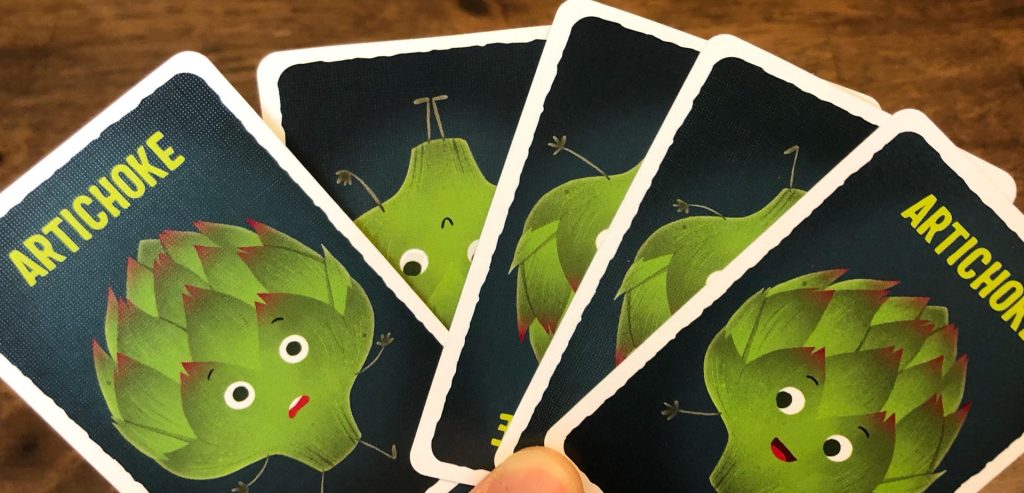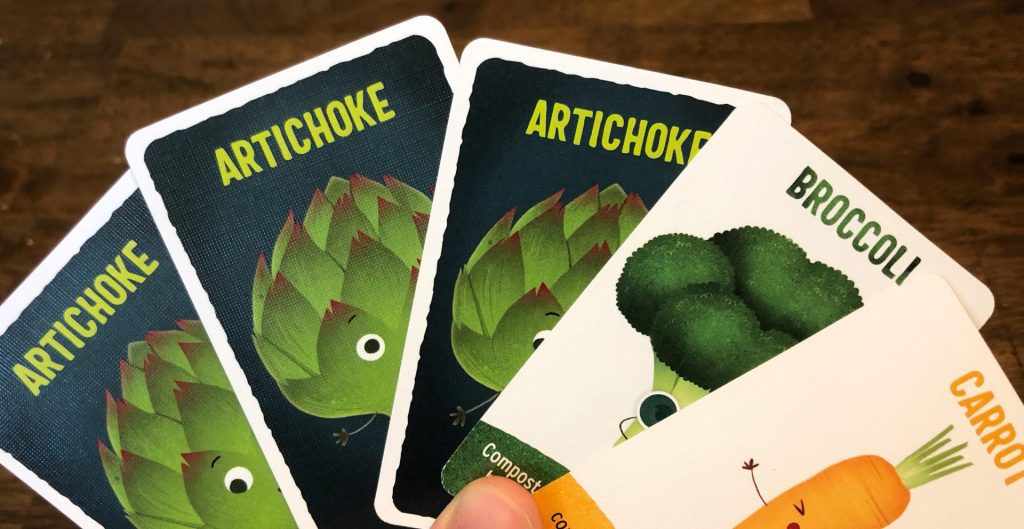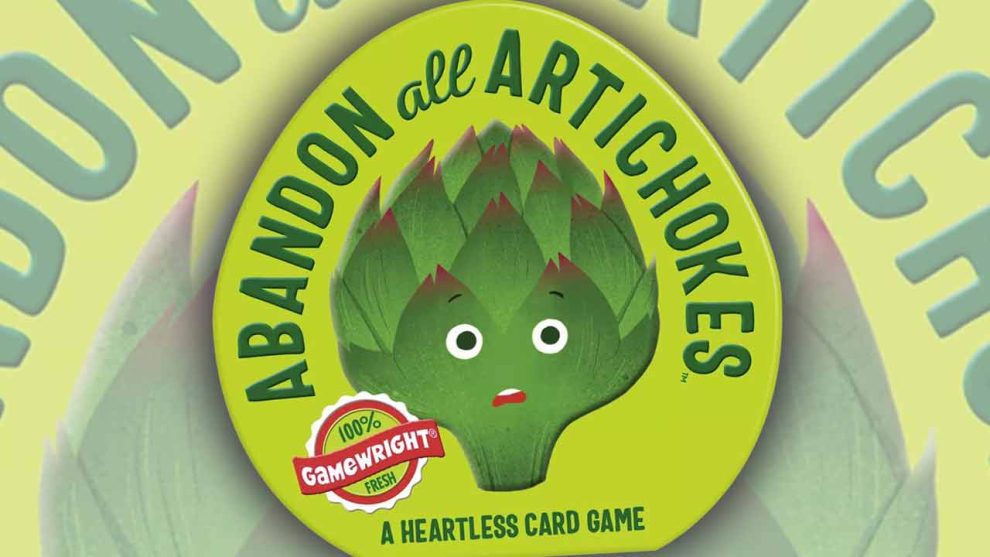Disclosure: Meeple Mountain received a free copy of this product in exchange for an honest, unbiased review. This review is not intended to be an endorsement.
There are few things as ubiquitous as the idea that kids hate vegetables. Brussels sprouts, broccoli, or cabbage: they’re all viewed with suspicion at best and tantrums at worst. The artichoke is a particularly hard sell with its spiky leaves, blandish-bitter taste, and tedious teeth-scraping process. Much as adults might love them, they’re hardly popular with the high-chair-and-booster crowd.
So it makes sense that Gamewright’s Abandon All Artichokes, designed by Emma Larkins, puts that maligned vegetable at the heart of a fast-and-furious “deck-wrecker” where players race to dump their artichokes and get a hand full of wholesome veggies before everyone else!
All Decked Out
The goal of Abandon All Artichokes is to be the first player to draw a hand without any Artichoke cards. Each player begins with a deck of 10 Artichoke cards, 5 of which they’ll draw as their starting hand.

On a player’s turn, they’ll take one of the various vegetable cards available in the central Garden Row and add it to their hand. Next they’ll start playing cards from their hand in any order they please, taking the actions indicated on those cards, until they either run out of available actions or decide to stop. Once they’re done playing cards, they’ll discard anything remaining in their hand and draw a new hand of five cards, shuffling their discard pile to reform their deck if necessary. If the hand they draw contains no Artichokes, they’re contractually obligated to yell “ABANDON ALL ARTICHOKES!” at the top of their lungs in order to seal their victory. Otherwise the Garden Row refills to five cards and play continues to the next player.

The core ruleset is fairly simple, but the real meat of this game is in the vegetable cards. Artichokes themselves are dead weight, unable to be spent for an action. The other vegetables offer different ways to either get rid of Artichokes (“Composting” them to remove them from the deck) or interact with other players in some way. For example, the brash Broccoli allows the player to Compost an Artichoke—as long as they have 3 Artichokes in hand. The humble Potato lets the player flip the top card of their deck, Composting it if it’s an Artichoke or discarding it if not. The risky Peas, by contrast, don’t directly remove Artichokes. Instead, they let the player look at the top two cards of the Garden deck, placing one in their discard pile and the other in an opponent’s.
The trick, of course, is synergy. Loading up on one particular vegetable isn’t necessarily going to win the game. Combining different veggies and finding the best order in which to play certain cards separates the hungry from the satisfied. With a well-balanced diet (and strategy) you might just be able to chew through your deck and clear out those nasty Artichokes before anyone else.
Season to Taste
I’ve played Abandon All Artichokes countless times now and I like it a lot. The art is absolutely adorable and the Gamewright tin adds to the charm. It’s a brisk game that plays in about 20 minutes even with distracted kids. From a gamer perspective it’s a really great introduction to deck management games: there’s plenty to chew on here with regards to probability, deck velocity, balancing different effects, and timing your plays for maximum impact. When my daughter started regularly comboing three or four cards a turn, I knew that this was a keeper.

That said, Abandon All Artichokes features a significant amount of luck. It’s possible for someone to get a perfect hand and win the game even with a bunch of Artichokes still in their deck. Because the cards vary widely in strength and utility, it can also be a little frustrating when one player gets the right cards at the right time and the other players don’t have the same option.
For example, grabbing a first-turn Carrot puts one player at a significant advantage from the start. (The Carrot card Composts two Artichokes and itself at the sole cost of being the only action a player can take on their turn, making it a devastatingly powerful card to get early on when actions are thin and Artichokes are plentiful.) Since it’s a family-weight game, that swinginess serves a purpose by allowing kids to compete on an even footing with adults, but some players might find it off-putting.

There are also some slight mechanical issues. There’s lots of shuffling to do, which can be a problem for kids who haven’t developed that skill yet. Similarly, there’s a fair amount of reading for a game that’s aimed at younger children. And because players can only win at the end of their turn there’s occasionally a long moment of shuffling-related downtime before determining whether the game should continue. Sometimes that end comes quite suddenly, even with eagle-eyed adults tracking the number of Artichokes in each deck!
Ultimately, I like what Abandon All Artichokes brings to the table. It’s a light game that’s not too clever and not too dull, perfect as an appetizer for a casual game night or a quick snack before the kids’ bedtime. If your family wants a fun food fight that anyone can play, then you definitely want to Abandon All Artichokes!












Add Comment